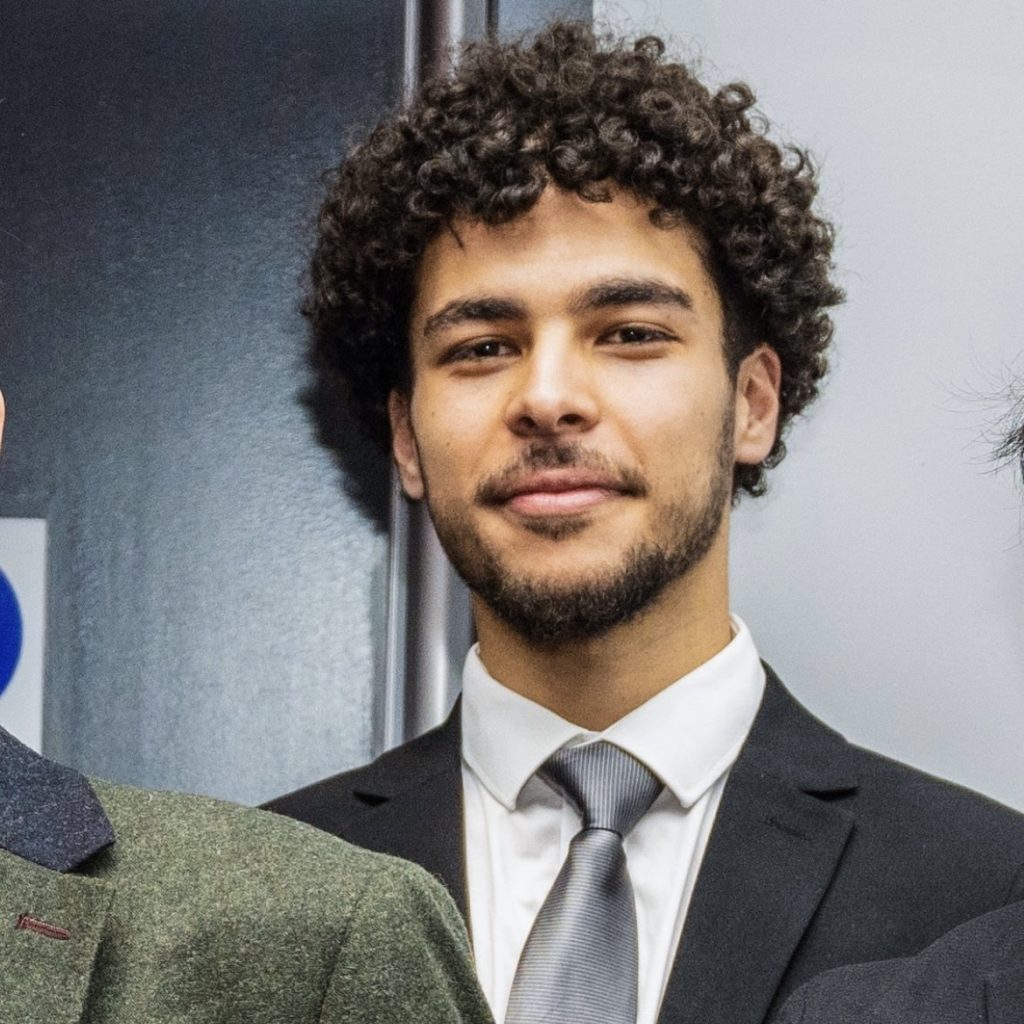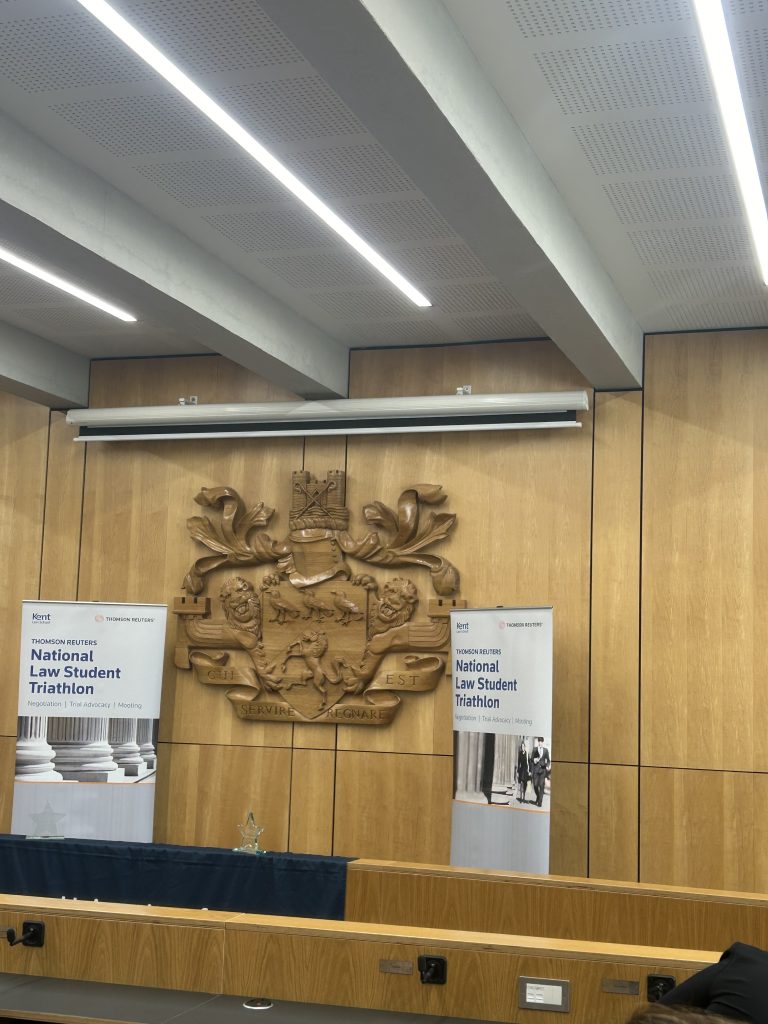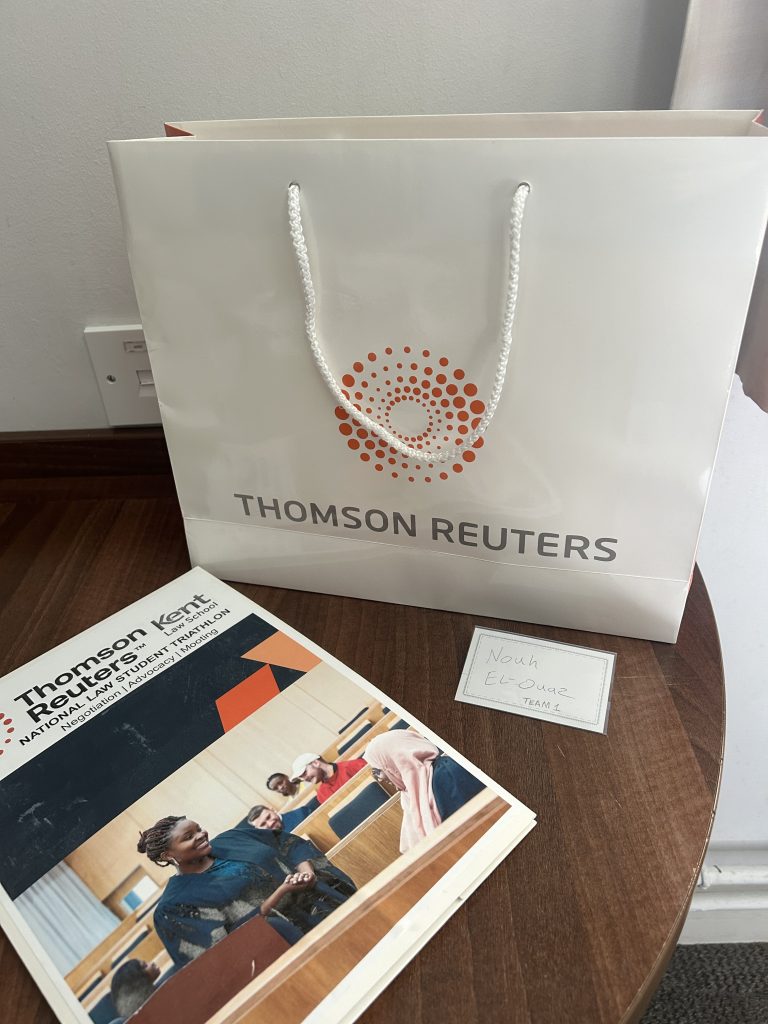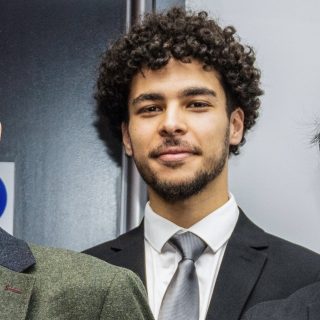The KLS-Thomson Reuters Triathlon takes place in April each year and gives undergraduate students an immersive experience, allowing them to meet a range of practitioners and get exposed to an array of legal skills. Pairs of students from universities across the UK complete in a number of different disciplines and stay at the University of Kent for the weekend. To get enthusiastic mooters this year thinking about what they might get involved in, we thought we’d commission a piece from the 2023/24 City team, which consisted of two LLB3 students, Nouh El-Ouaz and Helin Usal. Here Nouh tells us about the experience…
During the event, your team of 2 students will be asked to perform a negotiation, a piece of first instance advocacy and then a moot. The same problem scenario throughout has been designed so that students can see the different stages a case may go through.

The KLS-Thomson Reuters Triathlon challenges law students across the UK to use their skills in mooting, negotiation, and trial advocacy. I had the pleasure of representing City at the 2024 competition which related to a contractual dispute alongside fellow LLB3er Helin Usal.
After weeks of preparation, the time had come to make the journey to Kent for the competition. I spent a full shift at my part-time retail job rehearsing my opening statement under my breath and then hurried home to pick up my prepacked bag and get to King’s Cross as quickly as possible. Despite my best efforts and a sprint worthy of the Paris Olympics, I missed the train by a single minute. A couple of trains to Canterbury West and a taxi ride later, I finally arrived at Kent University’s campus. Late-night preparation, excitement, and the anxiety of realising I had forgotten a tie made the night before the competition one of little sleep. Breakfast was a relatively quiet affair at first, although we managed to befriend a group from another university.
The Mooting
On paper, the moot ought to have been the most intimidating aspect of the competition. The round was judged by Lord Justice Stephen Males, Her Honour Adele Williams DL, and Richard Honey KC. Nerves were natural; however, I had learned that nerves and excitement are physiologically the same and convinced myself I was feeling the latter. As Senior Counsel for the Respondent, I spoke second. Delivering the opening statement I had rehearsed so many times, I felt the excitement wash over me and my mind focus on the issues at hand. I started with counters to my learned friend’s submissions before moving to my own. I had three to make good, and early interventions to my counters left me without much time. My first submission went relatively well with the to-be-expected judicial interventions, but I made an error in my second. While my ground of appeal related to implying a term, Richard Honey KC had noted that my second submission erroneously addressed issues of construction. After an on-the-spot concession, I reframed the argument as an alternative if the case on implication was unsuccessful. I addressed the submission in full before my time ran out and invited the Court to turn to my skeleton argument for the final submission.
The round was one of quality from both sides. The general feedback was to maintain a greater focus on the facts of the case rather than the principles of law. I was individually praised for signposting, maintaining a good pace, and making concessions when I ought to. To improve, I was told not to use the phrase ‘thank you for that question’ after judicial interventions. I picked it up acting as a bailiff in the 2023 Jessup Moot but was told that the judges understood it (perhaps correctly) to be inauthentic and a stalling tactic. I was far more confident in later rounds and competitions to simply take a moment to consider the question if more time was needed.
The Negotiation

Notwithstanding an academic familiarity with ADR, I had no experience with negotiation before the competition. Thankfully, the negotiation was civilised; this was in stark contrast to the shouting and table banging recounted by another competitor. While both sides maintained their positions firmly and understood their redlines, we consciously committed ourselves to cooperating in the negotiation. It certainly helped that we had established a good connection with the same team at breakfast earlier. I led the discussion, starting with the aims of the negotiation, moving to areas of similarity, and ending with areas likely to be in conflict.
This approach proved to be effective and created a resolution which granted our fictional client a more favourable position than we had anticipated going in. After our 30 minutes of allotted time, we were asked for self-reflection. Our team felt that it had gone well and that the outcome was beneficial. We suggested that we might take an even more cooperative approach in future considering the opposing side’s reluctance to accept one of our proposed terms and the issues that could have arisen from pushing the point. The judges agreed and praised us for taking a structured and effective approach. I was worried I had occupied more of the speaking time than others (it was difficult to judge as a first-timer), but was relieved when the judge gave this feedback: ‘Nouh dominated the negotiation, but he was a great speaker so I preferred it’.
The Trial Advocacy

Everything that goes up must seemingly come down. Notwithstanding high spirits from the negotiation, the trial advocacy felt far more challenging. Since we were applying for an ex parte freezing order, the judges tried to imitate the attitude of a judge who had been woken up for an emergency trial. While composed on the outside, we felt the pressure internally with little to no engagement and an almost bored demeanour from the judges. In particular, I was given a judicial intervention by a judge which I attempted to answer multiple times without success before feeling compelled to postpone my response for later submissions. To be candid, I felt in that moment it was the worst piece of oral advocacy I had ever delivered. The feedback which followed proved the contrary. The judges, now smiling, praised us for applying the relevant test efficiently, remaining confident (at least externally), and asking for time where necessary. Additionally, I was relieved to find out that the judicial intervention which I was unable to answer was completely nonsensical. The judges explained that life at the Bar meant often being asked things which do not entirely make sense and suggested that we should have the confidence to question the relevance of a particular intervention.
Takeaways
Each aspect of the Triathlon was enjoyable and challenging. The extra training sessions, panel event, and mock trial particularly enhanced the competition. The training sessions were enriching. They gave a great insight into impactful advocacy and asking objective questions when cross-examining a witness. The panel event featured a wide range of perspectives and routes to the legal profession which felt down-to-earth and relatable.

The mock trial was a play on the Goldilocks story which was entertaining. It was enjoyable to see practitioners and judges engaging in some light-hearted and imaginative storytelling. The opportunities to network at meals and after the mock trial were encouraging and I was grateful to get a lot of helpful advice that I have since carried forward.
The following morning featured the final award ceremony. Our team placed 3rd and, to my complete surprise considering my feelings about it in that moment, I was awarded a prize as the best individual competitor for the trial advocacy. Independent of any external recognition, the competition was a wonderful experience. I would recommend it to all law students. Preparing for three separate exercises may seem daunting, but the ability to build off each round and develop your skills holistically is unmatched. Furthermore, working in pairs towards such a time-consuming task provided an in-built support system to boost morale.
Nouh El-Ouaz is Master of Laws (LLM) candidate at UCL and a Visiting Lecturer at The City Law School.

